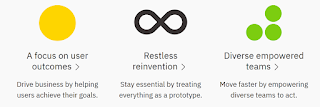This is part-1 of a multi series blog about Delivering Dynamics 365 online (CRM) in the Enterprise. Microsoft Dynamics is now the business application platform of choice for Enterprises who are doing Digital Transformation projects. Dynamics 365 in conjunction with Azure and Office 365 is a strategy tool that Enterprise can depend, build upon and deliver long term business growth models with confidence.
At IBM, Enterprise Design Thinking is helping project teams to deliver better experiences at scale. I will discuss its use in conjunction with Agile and how it helps in Dynamics 365 project implementations.
 |
| Enterprise Design Thinking @ IBM |
1. Why Enterprise Design Thinking - Dynamics 365 is a multi-faceted platform that can, in enterprises, be used for Sales / Customer Service / Marketing / Custom business process / Portals... When selecting the optimum business application where Dynamics 365 will be most useful, it is critical to identify the right problem to solve. There are 2 steps to be followed for the success of an Enterprise project.
- Step-1 Doing the right project. - There can be multiple strategy / tactical options for an Enterprise to select from when planning for Digital Transformation. Due to budget, time and resource constraints (the eternal project constraints) management has to select the right strategy option / program for the organization. Enterprise design thinking is an approach to identify the strategic goals that will deliver the best outcomes for the user and customer.
- Step-2 Doing the project right - Once the right project / program is selected and the goals / hills are identified, the design and delivery of the project (doing it right) is where Agile project implementation really makes a difference.
2. How does it work for Dynamics 365? - Enterprise Design Thinking is based on set of principles - Some of the key concepts are
- Focus on user outcomes - This is to enable the future users of Dynamics 365 to make a substantial difference in how they do their current work for their customers. The challenges faced by the users are highlighted and a future outcome is envisioned. The 'aha' moment in delighting the customer is defined as Hills (goals).
- Team work - People from different areas come together as a team to collaborate. They work together, develop mutual respect, trust and ideate. In Dynamics 365 we have multiple teams working together like - Dev, QA, business users, BA's, integration... They need to be guided with the same goal. The hills identified become the guiding star that everyone looks upto as a team when working on the project. There are many tools / artificats in Design Thinking process that help the team to collaborate, think and reflect together.
- Relentlessly reinvent - This is the iterative cycle of improvement. As we design and deliver solutions for better user outcomes, the process of feedback can help improve and provide an even better solution. It is also key to consider everything as a prototype and deliver solutions faster in an iterative manner. Dynamics 365 / Power Apps helps to design and present prototype to business users in a short time so that they can get a quick view of the proposed solution. Any feedback can be incorporated in the early design stage.
Agile and Enterprise Design Thinking have lot of similarities and when used in conjunction they help business in envisioning, designing and consistently delivering better solutions.
Do let me know about your experience with Design Thinking. In my next blog (part-2) I will write about the agile implementation process for delivering Dynamics 365. Thank you for reading.
Mihir Shah